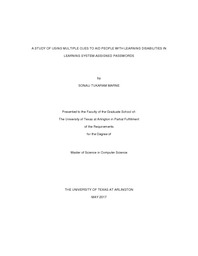
ATTENTION: The works hosted here are being migrated to a new repository that will consolidate resources, improve discoverability, and better show UTA's research impact on the global community. We will update authors as the migration progresses. Please see MavMatrix for more information.
Show simple item record
| dc.contributor.advisor | Wright, Matthew | |
| dc.contributor.advisor | Zaruba, Gergely | |
| dc.creator | Marne, Sonali Tukaram | |
| dc.date.accessioned | 2017-07-03T15:34:34Z | |
| dc.date.available | 2017-07-03T15:34:34Z | |
| dc.date.created | 2017-05 | |
| dc.date.issued | 2017-06-06 | |
| dc.date.submitted | May 2017 | |
| dc.identifier.uri | http://hdl.handle.net/10106/26820 | |
| dc.description.abstract | Traditional user-chosen passwords often offer weak password security and are prone to password reuse and password patterns whereas system-assigned passwords are secure but fail to provide sufficient memorability.
LDs are problems that affect the brain’s ability to receive, process, analyze and store information, i.e. they are disorders of neurologically-based processing. These problems can make it difficult for an individual to learn as quickly and accurately as someone who isn’t affected with learning disabilities. Learning disability cannot be cured or fixed but may make it hard to learn and use passwords. With right assistance and with unique learning strategies, we may hopefully produce an authentication system to compensate for the weakness.
CuedR, a graphical authentication scheme that provides multiple cues (audio, visual, verbal and spatial) to help users learn system-assigned passwords, showed promising memorability in prior studies, where 98% of users were able to log in successfully one week after learning their password .In this thesis we explore how whether CuedR’s multi-modal recognition-based approach would be helpful for people with LDs.
In particular, we conducted a single-session lab study, with 19 participants. The participants had a 100% success rate using CuedR. Seven (37%) of the participants had to re-learn their password during registration. Our analysis shows that verbal, visual and audio cues helped the users with learning disabilities to overcome the difficulties to read, hear and interpret information as compared to traditional passwords.
This study is a preliminary work to understand features of a system which would help people with LDs. Also, the findings from this study show potential for future studies aimed at people with LDs. | |
| dc.format.mimetype | application/pdf | |
| dc.language.iso | en_US | |
| dc.subject | CuedR | |
| dc.subject | Learning disabilities | |
| dc.subject | Memorability | |
| dc.subject | Multiple cues | |
| dc.subject | Graphical password | |
| dc.title | A STUDY OF USING MULTIPLE CUES TO AID PEOPLE WITH LEARNING DISABILITIES IN LEARNING SYSTEM-ASSIGNED PASSWORDS | |
| dc.type | Thesis | |
| dc.degree.department | Computer Science and Engineering | |
| dc.degree.name | Master of Science in Computer Science | |
| dc.date.updated | 2017-07-03T15:36:42Z | |
| thesis.degree.department | Computer Science and Engineering | |
| thesis.degree.grantor | The University of Texas at Arlington | |
| thesis.degree.level | Masters | |
| thesis.degree.name | Master of Science in Computer Science | |
| dc.type.material | text | |
Files in this item
- Name:
- MARNE-THESIS-2017.pdf
- Size:
- 1.080Mb
- Format:
- PDF
This item appears in the following Collection(s)
Show simple item record


